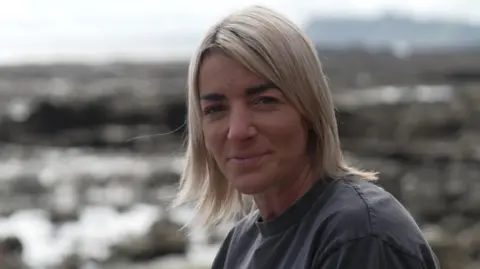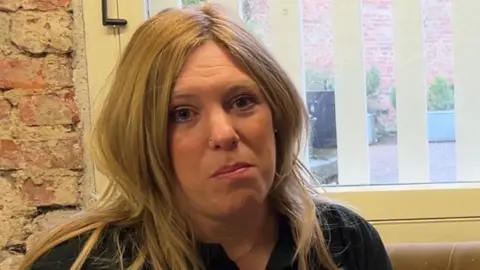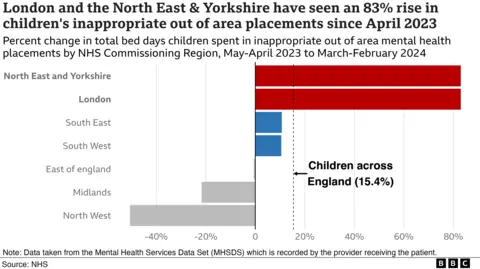Children with anorexia sent 100 miles for care
 BBC/Louise Fewster
BBC/Louise FewsterVulnerable children with eating disorders are being sent to live more than 100 miles from their families because of a shortage of beds in local specialist hospitals.
The mother of one 14-year-old girl from Scarborough who is being treated for anorexia nervosa 125 miles away at a specialist private hospital on the NHS said her daughter felt “abandoned”.
Stacey, 39, told the BBC the teenager had begged her to visit more often but the distance meant she could only make the journey on weekends.
The government said it was investing an extra £2.3bn in mental health services, and was working to increase community services across the country.
'You have nobody'
Stacey said it was “upsetting” to know her daughter was “in a place where you have nobody and you know your parents aren’t just round the corner”.
Her daughter is being treated in what the NHS calls an “inappropriate out of area placement,” in which a patient is placed at a hospital far from their home because of a shortage of local provision.
The journey means an eight-hour round trip for her family, and the teenager has been told she may not show any signs of improvement for up to a year.
Stacey, who has two other children, said family and work commitments meant she could not travel to see her daughter on weekdays.
The two nearest mental health units for children in North Yorkshire up to the age of 18 are Mill lodge in York and Inspire in Hull.
However, neither has the facilities required for treating Stacey's daughter, even with beds available.
Stacey's daughter is one of a number of teenagers to be sent to an inappropriate out of area placement due to a shortage of beds locally.
 BBC/Louise Fewster
BBC/Louise FewsterIn 2022, 15-year-old Annie was sent more than 100 miles from her family in North Yorkshire to be treated for anorexia.
The teenager said she loved riding her pony Maddie until the eating disorder took over.
She said: “I did a few competitions with her. She used to be a good little jumper until she stopped. That was when I thought I was too big for her and I stopped eating.”
Speaking about her experience of hospital, Annie said: “When I first got there I was on a tube and then I realised I am not going to get out.
"So, I had to eat so I could go home and be with my pony. That was the only reason why I was eating because of her.”
 BBC/Louise Fewster
BBC/Louise FewsterAnnie’s mum Donna was told that because her daughter was so poorly there was nowhere local where she could be treated on the NHS, so they had to search across the country for a bed.
She said travelling more than two hours to see Annie once a week was hard.
"It affected our whole family. Our whole family dynamics changed," Donna said.
Now discharged and on the road to recovery, Annie said being in hospital a long way from home was a lonely experience.
She said: “Everyone else’s parents came every night, but I only got to see mine once a week and that was quite hard because I was just sat there on my own”.
The journey was “just too far” for her mother to visit more often, Annie said.
 BBC/Louise Fewster
BBC/Louise FewsterDonna has set up an eating disorder support group called Kick Rexi Out to help others who feel desperate and alone.
“This time last year Annie wasn’t good,” Donna said. “But it just proves that getting the right help and the specialist treatment can bring your child back.”
The government had pledged to end inappropriate out of area placements by the end of March 2021. But that has not happened.
The latest NHS data shows there has been a 15% rise in the number of days children in England are spending miles away from home in mental health hospitals in the past year.
Yorkshire and the North East along with London have seen the biggest increases from the year ended in April 2023.
Variations in NHS data about inappropriate out of area placements may in part be because of changes in service provision or data quality limitations.

The Royal College of Psychiatrists (RCP) is campaigning to end inappropriate out of area placements.
Dr Ashish Kumar, chair of the RCP's Eating Disorders Facility, said forcing children to travel hundreds of miles for treatment put their health at risk and was costly to the NHS.
“Eating disorder services are stretched thin due to staff shortages and chronic underfunding,” he added.
The eating disorder charity Beat has called on the government and NHS England to better fund and staff the service.
Tom Quinn, the charity's director of external affairs, said they must “take urgent action to improve recruitment and retention of staff to make sure eating disorder funding reaches the front line".
'Early intervention'
A Department of Health and Social Care spokesperson said it was “determined to support children with their mental health” and was “investing an additional £2.3bn a year into NHS mental health services”.
They added the government was increasing capacity at children and young people’s community eating disorder services across the country.
A spokesperson for NHS England North East and Yorkshire region said that they acknowledged more funding was still needed, and that they were "focusing on strengthening early intervention while ensuring swift access to specialist support as soon as an eating disorder is suspected".
If you have been affected by any of the issues raised in this story you can visit BBC Action Line.
Additional reporting from Miguel Roca-Terry and Jonathan Fagg
Follow BBC Yorkshire on Facebook, X (formerly known as Twitter) and Instagram. Send your story ideas to [email protected].
